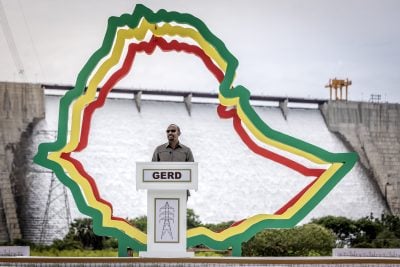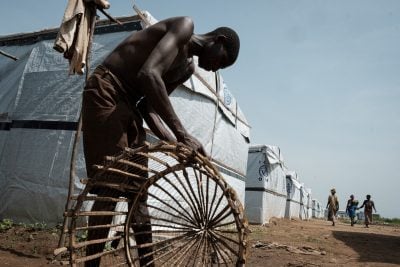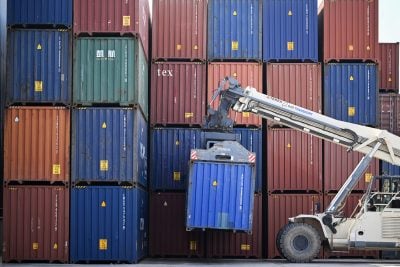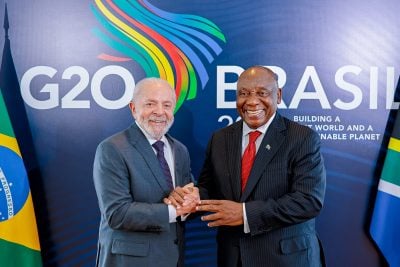Russian foreign minister Sergei Lavrov is on an official four-day visit to Africa as he seeks to persuade African leaders that Russia’s invasion of Ukraine is not responsible for spiralling global food prices.
The tour comes just days after the UN and Turkey brokered a deal between Russia and Ukraine to allow Ukrainian grain to be exported via the Black Sea.
The deal – which has been praised by the African Union – was immediately brought into question by Russian missile attacks on the key Ukrainian Black Sea port of Odesa. After an initial attack on the port area on Saturday 23 July – just a day after the deal was signed – Ukrainian officials reported further attacks in coastal villages in the region in the early hours of Tuesday 26 July.
Lavrov began his tour with a trip to Egypt on Saturday, where he spoke at the Arab League in Cairo and praised member states’ “balanced, just and responsible position” on the war.
Lavrov then went to the Republic of Congo, the first visit by a Russian or Soviet foreign affairs minister to the country, and is currently in Entebbe, Uganda, where he was warmly welcomed by President Yowerei Museveni.
“Russia has been supporting the anti-colonial African movement for the last 100 years, and I commend their long-standing relationship with Uganda,” he said.
Asked whether he was supporting Western powers or Russia in the context of the war in Ukraine, Museveni, who took office 36 years ago, simply said:
“I am pro-myself. And I deal with other people according to how they relate with my own interest.”
Lavrov’s fourth and last stop on the continent will be on Thursday 28 July in Addis Ababa, Ethiopia, where the African Union has its headquarters.
Apart from Ethiopia, all of the countries visited by Lavrov source the majority of their imported wheat from the region, making them vulnerable to disruption to supply routes through the Black Sea. Approximately 13.5m tons of wheat and 16m tons of corn are estimated to be stuck because of the war.
Competing narratives on food crisis
Lavrov’s argument that Russia is not to blame for the food crisis is fiercely debated by Western nations, who argue that the invasion of Ukraine – one of the major global exporters of grains – is exacerbating a complex global food crisis.
The foreign minister’s visit has been launched alongside a coordinated PR campaign. In a column published in newspapers in the four countries included in his tour, Lavrov wrote that Russia appreciated “the considered African position as to the situation in and around Ukraine”.
Most African countries have been reluctant to take sides over the war. Earlier this year, 17 African countries abstained from the UN General Assembly vote to condemn the invasion of Ukraine, while eight others were absent and one voted against.
The African Union has adopted a position of neutrality throughout the conflict, calling for the parties to establish an immediate ceasefire and open negotiations.
After the signing of the grain deal on last Saturday, the Chairperson of the African Union, Moussa Faki Mahamat, wrote on Twitter that the AU “reaffirms its continued and steadfast commitment to multilateralism and the shared responsibility of all members of the international community to work towards global peace & security.”
His spokesperson, Ebba Kalondo, underlined the role that the AU had played in bringing about the deal.
French President Emmanuel Macron’s visits to Cameroon, Benin, and Guinea-Bissau the same week mean that Lavrov’s arguments are not likely to go unchallenged.
In a speech given at a meeting with the French Community in Yaoundé on Tuesday, Macron fiercely refuted the argument that the European Union is responsible for the global food crisis.
“This is totally false. It is simply that food and energy became Russian weapons of war,” he said.
The French President argued that the current crisis was an opportunity for many African countries to develop a “sustainable and resilient agriculture,” before reminding of the Food and Agriculture Resilience Mission (FARM) launched by France and the EU to foster food sovereignty in Africa.
Despite his limited success as a moderator in the Ukrainian conflict, Macron has been involved in the building of new routes for the export of grain, notably via Romania, before the grain deal was reached last week.
The World Food Programme has estimated that the number of severely food insecure people could increase to 323m by the end of 2022 due to the effect of Russia’s invasion of Ukraine on food production and distribution, with African states most at risk (see figure below).
“A failure to open those ports in the Odesa region will be a declaration of war on global food security. And it will result in famine and destabilisation and mass migration around the world,” David Beasley, executive director of the World Food Programme, wrote earlier this year.
Strikes on Odesa imperil deal
The future success of the deal is likely to be dependent on whether exports can resume even while missile strikes continue in the region.
The African Union has not yet made a statement about the strikes on Odesa since the deal, which have prompted Ukrainian and Western fury. Russia argues that strikes on Odesa since the deal have targeted military targets rather than shipping infrastructure.
Turkish defence minister Hulusi Akar, who actively participated in the negotiations in Ankara, said that he was concerned by the strikes.
"The fact that such an incident happened right after the agreement we made yesterday regarding the grain shipment worried us," he said.
Ukraine’s infrastructure minister, Oleksandr Kubrakov, says that Ukraine will continue with preparations to export grain and fertiliser under the terms of the agreement by ramping up exports from the ports of Chornomorsk, Odesa and Pivdennyi.
Article updated on 27 July 2022.
Want to continue reading? Subscribe today.
You've read all your free articles for this month! Subscribe now to enjoy full access to our content.
Digital Monthly
£8.00 / month
Receive full unlimited access to our articles, opinions, podcasts and more.
Digital Yearly
£70.00 / year
Our best value offer - save £26 and gain access to all of our digital content for an entire year!
 Sign in with Google
Sign in with Google 



